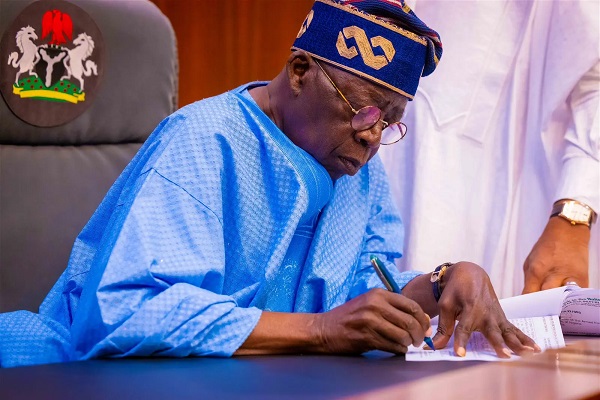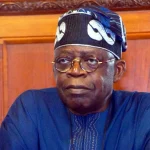In response to the ongoing outflow of Nigerian doctors overseas, President Bola Tinubu adopted the National Policy on Health Workforce Migration on Monday.
The goal of the strategy, which was revealed on Tuesday by Prof. Muhammad Pate, the Coordinating Minister of Health and Social Welfare, on his X account, is to attract the 12,400 Nigerian-trained doctors who are now working overseas.
Pate, who also made an appearance on Channels TV on Tuesday night, claims that 67% of doctors with training from Nigeria are currently working in the UK alone.
“The recruitment countries, that recruit our professionals, should they not have some responsibilities to help us expand the training? Because the strain of health workers’ migration is continuous; it’s not going to stop tomorrow.
“The UK will need Nigerian doctors; 67 per cent of our doctors go to the United Kingdom and 25 per cent of the NHIS workforce is Nigerian.
“Nigerians are very vibrant, very entrepreneurial, and very capable wherever they are. If Nigerians hold back from the UK, for instance, the NHS will struggle to provide the services that many Nigerians are going there to get,” the minister said.
According to Pate, the President’s approved policy is a comprehensive approach to controlling, reversing, and leveraging the departure of health workers rather than merely reacting to the current exodus of healthcare personnel.
Health professionals wanted to know the specifics and the strategy of execution even if they thought the policy might be beneficial.
Announcing the policy on Tuesday, the health minister said “This afternoon, HE President Bola Ahmed Tinubu, GCFR @officialABAT, in-council, approved a landmark policy set to transform healthcare human resource management in Nigeria.
“The National Policy on Health Workforce Migration addresses the critical challenges facing Nigeria’s health human resources. As the AU Champion for Human Resources for Health and Community Health Delivery Partnership, Mr President’s commitment to a resilient and robust healthcare system is powerfully reflected in this forward-looking policy.
“This policy is more than just a response to the ongoing exodus of healthcare professionals; it’s a comprehensive strategy to manage, harness, and reverse health worker migration. It envisions a thriving workforce that is well-supported, adequately rewarded, and optimally utilised to meet the healthcare needs of all Nigerians.”
A large number of Nigerian healthcare professionals go for better opportunities abroad, leaving their colleagues to deal with increased workloads and longer call times.
They claim that insufficient tools, growing job insecurity, unfavourable working conditions, and an unsatisfactory pay scale are the driving factors.
The minister stated that the Nigeria Human Health Resource Programme, which provides a framework for routine evaluations of working conditions and guarantees that health professionals, particularly those in underserved and rural areas, receive the accolades and benefits they deserve, is essential to realising this ambition.
“By fostering an environment conducive to professional growth and stability, the policy aims to retain top talent within Nigeria.
“In an increasingly digital world, integrating advanced health technologies is essential. The policy’s focus on digital health infrastructure—including electronic medical records, telehealth, and a comprehensive health workforce registry—marks a significant step towards a more efficient, data-driven health system. These innovations will streamline healthcare delivery and enhance the equitable distribution of health workers, ensuring access to quality care for all Nigerians.
“Capacity building is at the heart of this policy. It recognises the importance of continuous professional development, with strategic partnerships and opportunities for international training to equip our healthcare professionals with cutting-edge skills. This investment in human capital underscores our commitment to retaining and empowering our healthcare workforce,” he stated.
The initiative, he continued, addressed the repatriation and reintegration of Nigerian health professionals living abroad.
The minister stated that the initiative would actively reintegrate skilled professionals back into the health system in addition to encouraging their return by creating expedited registration procedures and offering alluring incentives.
“This approach leverages the expertise of our Diaspora to bridge gaps within the health sector. Also, the policy champions reciprocal agreements with other nations to ensure that the exchange of health workers benefits Nigeria.
“These bilateral and multilateral agreements are designed to protect national interests while respecting the rights and aspirations of our healthcare professionals. We call on recipient countries to implement a 1:1 match—training one worker to replace every publicly trained Nigerian worker they receive.
“Recognising the importance of work-life balance, the policy includes provisions for routine health checks, mental well-being support, and reasonable working hours, especially for younger doctors.
“These measures aim to create a supportive work environment, reducing burnout and enhancing job satisfaction.
“The governance of this policy will be overseen by the National Human Resources for Health Programme within @Fmohnigeria, in collaboration with state governments. This ensures responsible implementation and alignment with broader sector-wide health objectives.
“With this decisive action, the National Policy on Health Workforce Migration is set to secure the future of Nigeria’s healthcare system. Under Mr President’s leadership, this policy will further catalyse the transformation of our health sector, ensuring access to quality healthcare for all Nigerians.
“As we embark on this journey, all stakeholders are invited to contribute to building a healthcare system that reflects our nation’s potential and promise,” Pate said.
According to Hallah, the policy goes into force right away.
“It’s a policy, it was adopted by the Federal Executive Council yesterday (Monday). So, it is immediate, and it has been approved. So, it’s a Nigerian government policy. This is a policy binding on healthcare workers.”
He underlined that the FG has a strategy in place that permits healthcare professionals to receive training overseas and then return to use what they have learnt.
“Currently, there is a request by Qatar for 10 medical doctors to go there to study, especially in oncology. So, immediately after the training, they are coming back to the country,” he said.
The concept appears more theoretical than practical, according to Prof. Muhammad Muhammad, President of the Medical and Dental Consultants Association of Nigeria.
Muhammad also demanded the policy’s specifics in order to have a better grasp.
“The issue is that we need to see the detail, it’s not just the English that matters. People bring a lot of policies on the ground, very well drafted and crafted, but execution is usually a problem. It might be difficult to say we are fully in support or otherwise if we have not seen the document.
“I have planned to check on the Ministry of Health, maybe tomorrow (today), to see if we can get the document and look at it. They mentioned certain things that we have been advocating – the welfare of doctors, improvement of the work environment, and retraining, but how they are going to do it needs to be spelled out in the document.
“We were not consulted before drafting the document, so we don’t have an insight into what is in the document. If they are going to put it to work, what they have written might be beneficial to the system and to also the healthcare workers, but the problem is that there may be a lot of other things that we don’t know yet. For example, when they say they are going to stop the migration, in what way? Is it by preventing doctors from moving, or how are they going to do it?”
The MDCAN President stated that it is important for the public to be aware of whether the policy will strengthen or weaken healthcare workers’ rights.
According to him, the need that healthcare professionals be trained in a 1:1 ratio in order to replace all publicly trained Nigerian employees may imply that any nation hiring a healthcare worker would also be responsible for covering Nigeria’s training expenses.
If a doctor trained in a public institution is hired by Saudi Arabia, the United Kingdom, or Canada, they will expect Nigeria to reimburse them for the same amount that was used to teach the doctor in Nigeria.
Toba Odumosu, the secretary of the Lagos State Council of the National Association of Nigeria Nurses and Midwives, acknowledged that the policy looked promising but emphasised the need to better understand its specifics.
He also expressed support for the 1:1 training match for healthcare workers, pointing out that other nations have also successfully implemented this approach.
“For everybody that migrates to particular countries, you have a bilateral agreement for active recruitment of our health workers, then you find a way to sponsor the training of another healthcare worker in Nigeria. So the burden of training is not just on the Nigerian government, but the people who also benefit.
“That’s essentially what so many countries have done. In some cases, they have bilateral agreements that would mean that you actually go there for a certain number of years, and then you also find an agreement to come back to your country for a particular number of years before you are now free to migrate back. So, it’s sort of like a controlled migration system.
“But we need the details of the policy to understand how this works because we still need to allocate more funds in the health sector, and meet the 2001 Abuja health declaration,” he noted.
Data from the General Medical Council in the UK shows that as of December 3, 2023, there were 12,198 doctors with training from Nigeria who were licensed to practise in the country.
Also, according to information gathered from the Medical and Dental Council of Nigeria in 2023, there are no fewer than 281 Nigerian physicians employed in other African nations.
Based on the MDCN data, there are 153 Nigerian doctors working in Sudan; South Africa has 41 doctors there, Egypt has 17, Ghana has 17, Uganda has 13, and the Gambia has seven. The remaining are: Lesotho (6), Cameroon (4), Namibia (4), Algeria (2), Ethiopia (2), Kenya (2), Liberia (2), Benin (1), Botswana (1), Equatorial Guinea (1), Niger (1), Rwanda (1), Sierra Leone (1), Seychelles (1), South Sudan (1), Tanzania (1), Togo (1), and Zambia (1).
According to the most recent report on the number of nursing and midwifery professionals on the Nursing and Midwifery Council register as of March 31, 2024, there are currently 13,656 Nigerian-trained nurses and midwives practicing in the United Kingdom.
The report also revealed that, as of March 2024, Nigeria is one of the top non-UK countries of education and that the number of Nigerian nurses and midwives practicing in the UK increased by 28.3% in a single year.
In comparison to the previous year, the top non-UK nations of education as of March 2024 are Ghana (5,536), Romania (7,378), Philippines (49,092), India (62,413) and Romania (7,092).




